Low Ambition Climate Summit
Air Date: Week of November 25, 2022
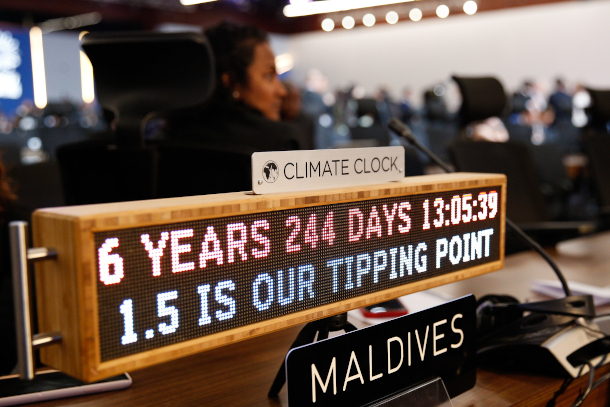
The Maldives delegation featured a “climate clock” at the COP27 climate summit in Sharm el-Sheikh, Egypt, November 2022. (Photo: UNclimate change, Flickr CC BY-NC-SA 2.0)
The annual meeting of the UN Climate treaty parties in Sharm el-Sheikh, Egypt known as COP27 went two days into overtime as negotiators worked late into the night hammering out a consensus. While the sleep-deprived delegates did produce an unprecedented agreement for rich nations to pay for loss and damage from climate disasters in poor countries, COP27 added no new brakes to keep the Earth from hurtling past the 1.5 degrees Celsius warming target of the Paris Agreement. Longtime observer of UN climate negotiations Alden Meyer, a senior associate at the think tank E3G, joins Host Steve Curwood to explain.
Transcript
CURWOOD: From PRX and the Jennifer and Ted Stanley Studios at the University of Massachusetts Boston, this is Living on Earth. I’m Steve Curwood.
Every year since 1995 the UN holds the climate summit conference of the parties, or COP, and invariably it goes into overtime at the finish as delegates from nearly 200 countries wrangle all night long about fixing the climate crisis. This year COP27 in Sharm el-Sheik, Egypt, took the bronze medal for tardiness, running two days late before finally hammering out a consensus. Except for sessions in Spain and South Africa, it was the longest COP in nearly three decades of annual climate treaty talks. The sleep-deprived delegates of COP27 did produce an unprecedented agreement for rich nations to pay for loss and damage from climate disasters in poor countries, though no money is on the table yet. But the rest of the decisions at COP27 were far more pleasing to the fossil fuel industry than climate protection activists. They warn COP27 added no new brakes to keep the Earth from hurtling past the 1.5 degrees Celsius warming target of the Paris Agreement. Tasneem Essop is the international Executive Director of Climate Action Network International and spoke at the final post-midnight plenary:
ESSOP: This decision taken on African soil brings the hope for vulnerable impacted peoples and communities, not just in the continent, but for the entire global south. This is a first step in a process to rectify the systemic injustice to billions of people, particularly in the Global South, who are the least responsible, but are on the frontlines of the climate crisis. We know that the hard work to operationalize the fund and mobilizing the funding starts now. We will be watching this process carefully and will not have patience for delay or obstruction to progress. While COP 27 begins to address the consequences of the climate crisis, it failed to commit to phasing out fossil fuels, which are at the root of the climate crisis. More fossil fuel extraction means more losses and damages and more devastation. We need a rapid, just, and equitable transition away from the fossil fuel era and into renewables. There is no climate justice without human rights. We are not yet defeated. We will never be defeated.
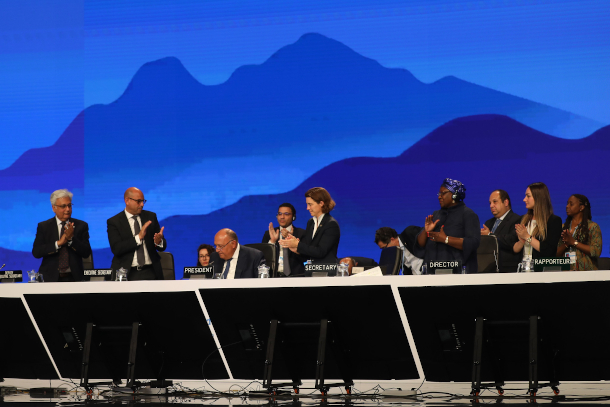
Negotiators applauded as COP27 wrapped up on the morning of November 20, 2022, after going into overtime. (Photo: UNclimate change, Flickr CC BY-NC-SA 2.0)
CURWOOD: Tasneem Essop, the international Executive Director of Climate Action Network International. For more on COP27 I’m joined now by Alden Meyer, a Senior Associate of the think tank E3G and longtime observer of UN climate negotiations. He’s just back from Egypt. Welcome to Living on Earth, Alden!
MEYER: Great. Thanks, Steve. Good to be with you again.
CURWOOD: So what's your reaction to the final text for the Conference of the Parties, number 27? Worst COP yet, some have said; how say you?
MEYER: Well, it was really a mixed bag. As you noted, we did have a breakthrough agreement on setting up a fund for loss and damage, which is helping the most vulnerable countries address the now unavoidable impacts of climate change. That still needs a lot of work to stand up and most importantly, to identify funds to go into the new fund. That was the bright spot. But on the downside, we really did not build on last year's COP in Glasgow, in terms of keeping 1.5 C alive. And we really didn't see much progress, not just at the COP, but over the last year since Glasgow, in countries stepping up to the plate and increasing ambition. So at last year's COP in Glasgow, a number of us, including Alok Sharma, the president of the COP, was saying that "1.5 C is in critical care." I'm afraid it's moving towards hospice care unless we dramatically ramp up action over the next year. It's still scientifically possible and technically possible to achieve 1.5 C, but it may be slipping out of reach in terms of the politics of it, and the radical transformation we need in ambition to get there.
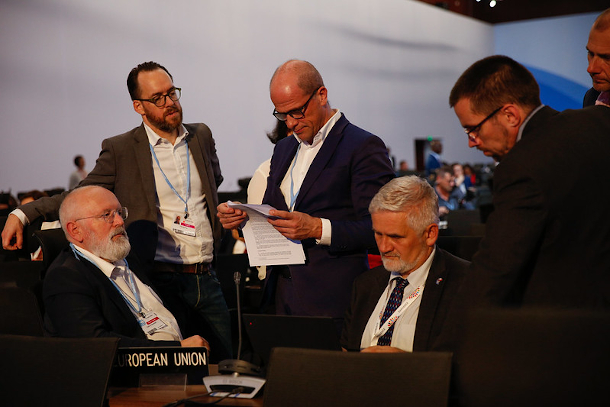
Delegates from the European Commission discussed the negotiating text in the early morning hours of November 20, 2022 (Photo: UNclimate change, Flickr CC BY-NC-SA 2.0)
CURWOOD: Alden, early on, there appeared to be broad support for language about phasing down the use of fossil fuels, beyond coal to gas and oil to be included in the final text from COP 27. Why was that ultimately scrapped?
MEYER: Well, we had India actually taking the lead on pushing to expand the fossil fuels away from coal and to include oil and gas. And there were more than 80 countries supporting that. But the Egyptian presidency never put that in the text. They were confusing their own national interests as a gas producer and exporter with their responsibility as the presidency to be a neutral broker. And you had a coalition of petro states such as Russia, Saudi Arabia, and Iran, with China and Brazil, vociferously opposing inclusion of that language in the decision. And as you know, Steve, under the UNFCCC, they have to operate on a consensus rule basis. And so they were able to block that addition at the end of the day, but I think it really has teed the issue up for the COP next year in Dubai, UAE and there will be pressure to take action on the mitigation side, which was really blocked in Sharm el-Sheikh.
CURWOOD: Give us an example, if you would, of the lack of transparency by this Egyptian presidency of this conference.
MEYER: Well, the Egyptians really were not transparent. One example would be on the final night before the closing plenary, they were showing countries texts of what they proposed to put forward. They weren't allowing them to have them in writing, they weren't allowing them to take pictures of them. For example, Frans Timmermans, who represents the European Union, was called in and had about fifteen minutes to look over the draft decision text. He was not allowed to have additional representatives from the EU in the room, he had to go back and, from memory, describe what he had seen. This is no way to run a process. The Egyptians clearly were trying to ram through texts that slowed down progress towards decarbonization and protected the fossil fuel countries and industries. And they didn't want to give the EU, the small island states, and other progressive forces time to regroup and prepare to object to this in the closing plenary. So that's just one example of how this process was not fair, inclusive and transparent.
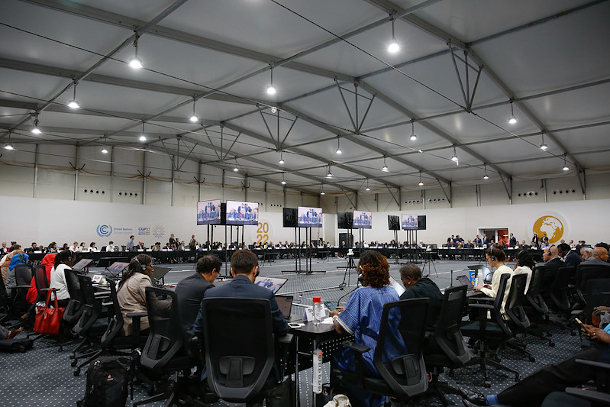
The heads of delegations met in a large hall on November 19, 2022, as COP27 ran into overtime (Photo: UNclimate change, Flickr CC BY-NC-SA 2.0)
CURWOOD: Alden, the big success of this conference that's being touted is that of a fund for loss and damage. To what extent is this agreement an admission by the developed nations of the world that they are responsible for the climate emergency?
MEYER: Well, I think it is an acknowledgment of that. They've resisted this for years now, if not decades, because of concern that they could be held liable for producing the largest share of historical emissions. But I think the pressure became overwhelming here based on a number of factors. You had the unity of the G77 and China block of developing countries, who were led this year by Pakistan, which is kind of the poster child for the impacts. You probably know that the damages imposed on Pakistan by the recent flooding could total $30 or $40 billion. And yet the aid that's been on offer from the US and Europe and others only amounts to a few hundred million dollars, about one percent of that total. So it really hit the breaking point, in terms of developed countries having to acknowledge not only the reality of the problem, but their responsibility to help address it. And so I think that's what really led to this decision. The other factor, of course, was some developed countries such as Canada, New Zealand and ultimately the European Union, agreeing that there needed to be this fund set up. And that put incredible pressure on the US to also drop its objections as it was isolated towards the end of the two weeks in Sharm el-Sheikh.
CURWOOD: There’s been promises of money for developing countries for years. I'm thinking, back in 2009 at Copenhagen, this $100 billion dollar a year fund to help with climate adaptation and mitigation was called for; it's yet to be fully funded. How did those funding arrangements fare at this COP? What additional energy was given to get those earlier promises moving?
MEYER: Well, that $100 billion dollar a year commitment was made in Copenhagen in 2009. There was a report put out by Germany and Canada just weeks before the COP saying that it has yet to be met, but predicting that it will be met next year. But of course, the $100 billion dollars itself is totally inadequate to the need to help developing countries decarbonize their economies and to deal with the impacts of climate change. On decarbonization, the International Energy Agency estimates that we need to generate somewhere between $2 and $4 trillion a year to help move away from coal and other fossil fuels to clean energy in these countries. And there are estimates that for adaptation and loss and damage, we could also be talking in the upper hundreds of billions, if not trillions. So it was discussed; the bigger focus, though, was really on what comes next with this new loss and damage fund, as well as what's going to replace the $100 billion dollar commitment after 2025, which is a big focus of discussion.
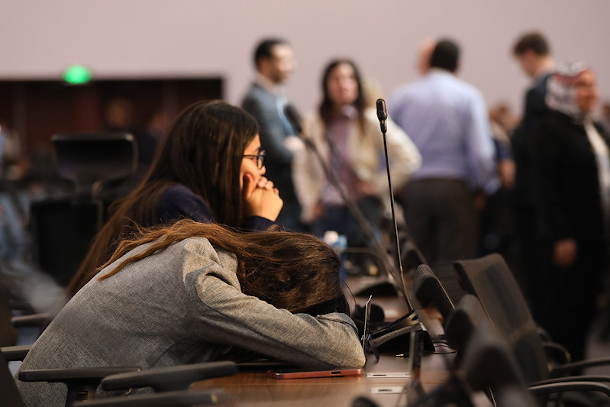
Fatigue set in as the negotiations wore on into the early morning hours of November 20, 2022. (Photo: UNclimate change, Flickr CC BY-NC-SA 2.0)
CURWOOD: By the way, how did the the meetings of the G20, those large economies— they met in times that really overlapped with COP 27. How did that play into the COP climate discussions this time?
MEYER: Well, the G20 Summit in Bali, which happened on Tuesday and Wednesday of the second week of the COP, actually was productive. It reiterated the commitment to the 1.5 Celsius temperature goal, it reiterated the commitment to phase down finance for fossil fuels. It did some useful things on the energy transition and how to speed that up towards clean energy. So it was a helpful force, and also, of course, the bilateral meeting between President Xi and Biden, on the Monday before the G20 in Bali was helpful. That enabled the restart of the US climate working group with China; towards the end of the second week, there were meetings between Special Envoy Kerry and Minister Xie Zhenhua of China. So that's going to get up and running again. So there were some positive signals. And of course, now we're looking forward to next year when India will be hosting not just the G20, but hosting the summit meetings of the Clean Energy Ministerial and Mission Innovation processes and hopefully, taking up the cudgel on pushing for expansion of the shift away from fossil fuels to include not just coal, but oil and natural gas.
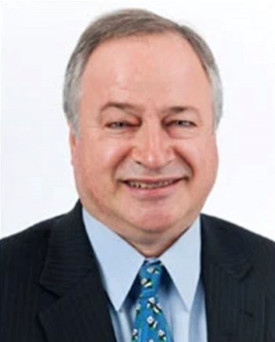
Alden Meyer is a Senior Associate at E3G working on US and international climate policy and politics. He is a Principal at Performance Partners, which provides a range of consulting services to clients in government, business, and the non-profit sector. (Photo: Courtesy of Alden Meyer)
CURWOOD: What confidence is there in the COP process, the UN Framework Convention on Climate Change negotiations, with another oil state, in this case, Dubai, coming aboard next year?
MEYER: Well, the UAE has made very clear that it intends to continue to be a producer of fossil fuels. The king of the UAE made that statement in his opening speech on the first Monday of the COP. But UAE has also been a progressive force in terms of deployment of renewables. It hosts the International Renewable Energy Agency. It has talked about wanting to have a major focus of the COP next year be on decarbonization, technological innovation and ways forward. So we're hopeful that it will be a force for good on that front. I think UAE has also learned a lesson watching the criticism that the Egyptians took for the way they managed the process: the lack of transparency, the chaos in the negotiations, conflating their role as the presidency of the process with their role as a major gas producer. So hopefully the UAE will run a better COP and we will really have a focus on the need to radically ramp up action on decarbonization if we're to have any hope of keeping the temperature goals in reach.
CURWOOD: Alden Meyer is a Senior Associate at the Climate Change Think Tank E3G and a veteran of the UN climate summit talks. Thanks for taking the time with us today, Alden.
MEYER: Thanks, Steve. It was great to be with you again.
Links
BBC | “COP27: Climate costs deal struck but no fossil fuel progress”
Living on Earth wants to hear from you!
Living on Earth
62 Calef Highway, Suite 212
Lee, NH 03861
Telephone: 617-287-4121
E-mail: comments@loe.org
Newsletter [Click here]
Donate to Living on Earth!
Living on Earth is an independent media program and relies entirely on contributions from listeners and institutions supporting public service. Please donate now to preserve an independent environmental voice.
NewsletterLiving on Earth offers a weekly delivery of the show's rundown to your mailbox. Sign up for our newsletter today!
 Sailors For The Sea: Be the change you want to sea.
Sailors For The Sea: Be the change you want to sea.
 The Grantham Foundation for the Protection of the Environment: Committed to protecting and improving the health of the global environment.
The Grantham Foundation for the Protection of the Environment: Committed to protecting and improving the health of the global environment.
 Contribute to Living on Earth and receive, as our gift to you, an archival print of one of Mark Seth Lender's extraordinary wildlife photographs. Follow the link to see Mark's current collection of photographs.
Contribute to Living on Earth and receive, as our gift to you, an archival print of one of Mark Seth Lender's extraordinary wildlife photographs. Follow the link to see Mark's current collection of photographs.
 Buy a signed copy of Mark Seth Lender's book Smeagull the Seagull & support Living on Earth
Buy a signed copy of Mark Seth Lender's book Smeagull the Seagull & support Living on Earth

